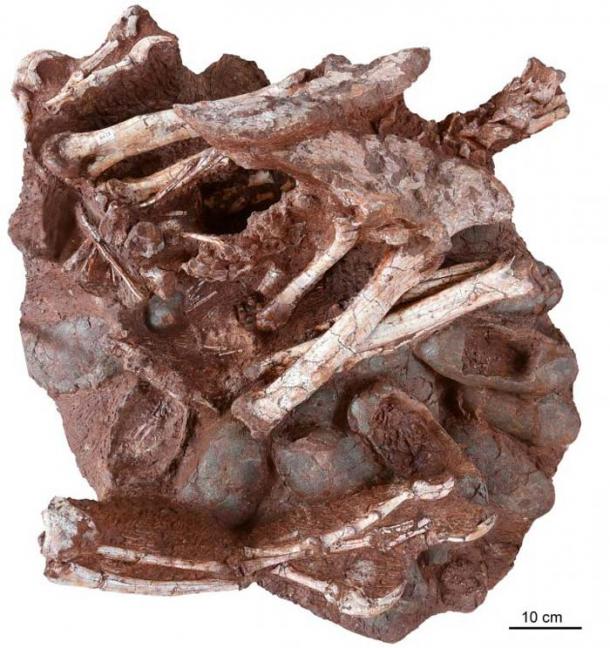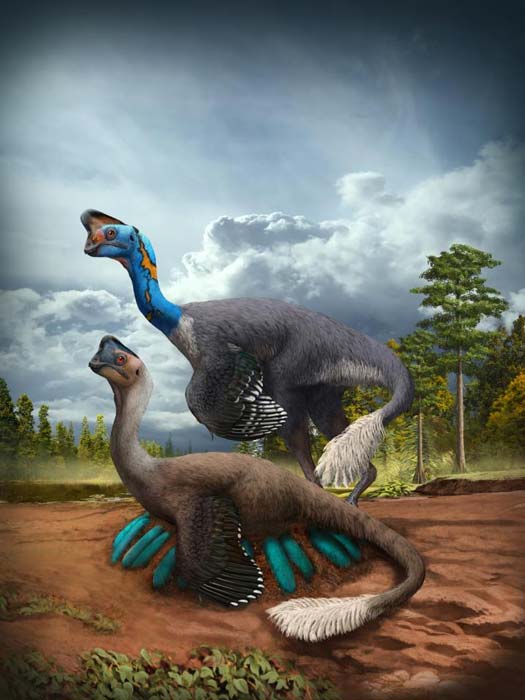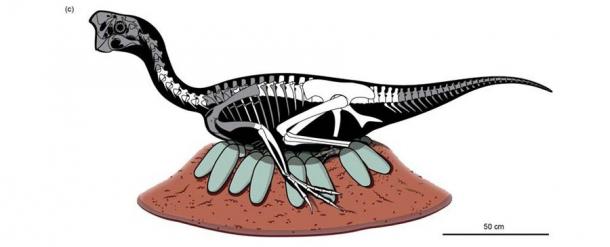Scientists have made a major discovery in Ganzhou City in China’s southern Jiangxi Province. They’ve found the remains of a dinosaur sitting on its nest of fossilized eggs.
The dinosaur, an oviraptorosaur (oviraptor), belongs to a group of bird-like theropod dinosaurs which peaked during the distant Cretaceous Period (145 to 66 million years ago). The fossils of the adult oviraptor and the eggs with the embryos have been dated to roughly 70 million years old. This is the first time researchers have found a non-avian dinosaur sitting on a nest of eggs which have been fossilized so they still contain the babies inside!

The ~70-million-year-old fossil in question: an adult oviraptorid theropod dinosaur sitting atop a nest of its fossilized eggs. Multiple eggs (including at least three that contain embryos) are clearly visible, as are the forearms, pelvis, hind limbs, and partial tail of the adult. ( Shundong Bi, Indiana University of Pennsylvania )
What Do the Scientists Say About the Discovery?
Dr. Shundong Bi, of the Centre for Vertebrate Evolutionary Biology, Institute of Palaeontology, Yunnan University, China, Department of Biology, Indiana University of Pennsylvania, USA, and lead author of the study, told EurekAlert!, “Dinosaurs preserved on their nests are rare, and so are fossil embryos. This is the first time a non-avian dinosaur has been found, sitting on a nest of eggs that preserve embryos, in a single spectacular specimen.”
Although there are a few other examples of adult oviraptor found on their nests with eggs, this is the first time that scientists have found embryos inside the eggs. Study co-author Dr. Lamanna, a paleontologist from the Carnegie Museum of Natural History, USA, explains: “This kind of discovery, in essence fossilized behavior, is the rarest of the rare in dinosaurs. Though a few adult oviraptorids have been found on nests of their eggs before, no embryos have ever been found inside those eggs.”
Dr. Xu, from the Institute of Vertebrate Paleontology and Paleoanthropology in Beijing, China, and one of the authors of the study, expects that this rare discovery holds a great deal of information, “It’s extraordinary to think how much biological information is captured in just this single fossil.” Dr. Xu says, “We’re going to be learning from this specimen for many years to come.”

An attentive oviraptorid theropod dinosaur broods its nest of blue-green eggs while its mate looks on in what is now Jiangxi Province of southern China some 70 million years ago. ( Zhao Chuang )
The Fossilized Eggs were about to Hatch!
The scientists found an incomplete skeleton of an adult oviraptor with pebbles in its stomach. This is an example of gastroliths, “stomach stones,” which the creature had consumed to help it digest its food. It’s also the first example of undisputed gastroliths found in an oviraptorid, which the team believes could help provide new information about the diet of these dinosaurs.
The dinosaur was found crouched over the nest of at least 24 fossilized eggs, in a brooding or protective posture. This suggests the dinosaur died while brooding or protecting its babies. But when the researchers used oxygen isotope analysis on the eggs they found that they had been incubated at high, bird-like temperatures, which support the belief that the adult more likely died while brooding its nest.

The partial skeleton of the oviraptorosaur was found on a nest of at least 24 fossilized eggs. ( Bi et al., Science Bulletin, 2020 )
At least seven of the fossilized eggs still contain the remains of unhatched oviraptorid embryos. Based on the development of the embryos, the scientists think that some of the eggs were on the verge of hatching. According to Dr. Lamanna, “This dinosaur was a caring parent that ultimately gave its life while nurturing its young.”
The article is published in Science Bulletin .
Top Image: Representational image of a baby dinosaur in an egg. Source: KtD / Adobe Stock
By Alicia McDermott
Related posts:
Views: 0
 RSS Feed
RSS Feed

















 March 14th, 2021
March 14th, 2021  Awake Goy
Awake Goy  Posted in
Posted in  Tags:
Tags: 
















